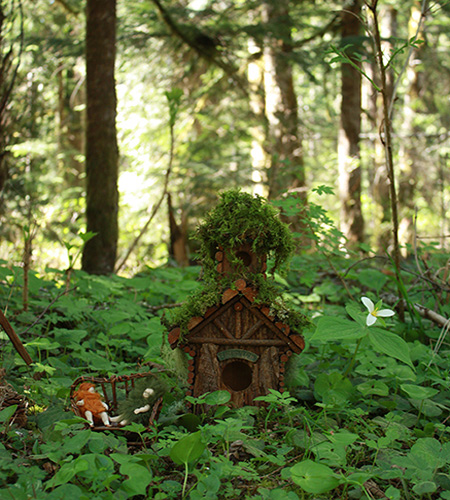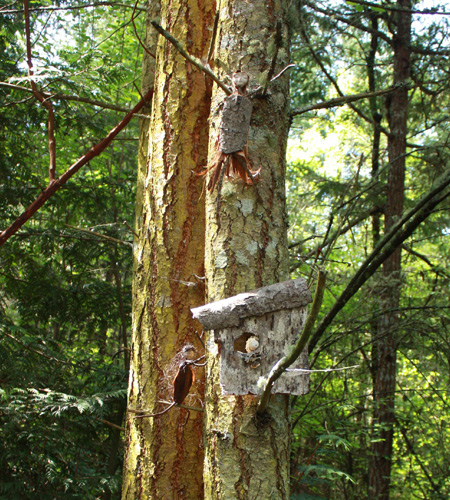|
|
||
|
How This Course Grew Like Topsy
Why is this a woo-woo class? Well, many of us have encountered people who think it's cute to call the psychic and intuitive things they don't understand — and may not want to understand — "woo-woo" while waggling their fingers in the air with a goofy grin. BUT I also have another reason. When I was a very small child, I couldn't say my own last name (Williams) and I pronounced it Woowoo. I find it amusing and relaxing to remind myself of how very young each of us is in the Universe and how very little we know — and that this need not stop us from learning and doing what we can, which includes some pretty amazing things. There is another thing about this. One of the people in this class referred to this as Jesa's Woo Woo Way. I was completely tickled by that. You see, there is a wu wei... which means, roughly but literally, "to do nothing" or "to do without effort". Let's see if I can explain this in Western terms. The Western tendency is to do things by pushing. We have a strange idea that the harder we are seen to be and knowing ourselves to be pushing, the better what we are doing will be. Not so. In this Universe of unknown powers and magic and inconceivable stuff intermixed with the science and other mundane things and ways of thinking, we humans are like small children compared with what we may eventually become. This is a course on Becoming. It doesn't have a set ending date, and I intend to continue it as long as anyone is interested and I'm able to. (It is also possible to begin at any time, but we'll talk more about that farther down this page.) This course began on 20 March 2013, at the approximate time of the vernal equinox. Each Wednesday thereafter (or as near to that as I can manage) a new post will be made. There are two ways to take this course. One way is to join the private Yahoo group, Jesa's Woo-Woo Class (instructions given below) where it will be possible to aks me questions, which I'll try to answer. The second way is simply to read and follow the lessons here on the web page, working independently and at your own pace. (Please note: I will not attempt to answer questions about the course for people outside of the Yahoo group. )
General topics that we will be covering may include meditation, energy perception, energy work, energy anatomy (including but not limited to chakras and kundalini energies), energy balancing and channeling, self-healing, distant healing, hands-on healing, intuitive awareness, psychic perception, psychic reading, oracle and tarot reading, spiritual counseling, dowsing, scrying, psychic art, kything, aura sensing, aura reading, working with the dying, working with the unborn, dream work, inner journeying for information and problem solving, vision quests, ethics and more ethics, faery stuff, spirit and spiritual stuff, and lots of other stuff. The class won't really be about dogma or theory, but about things we can experience, practice, and do — things that make a difference in our lives. In fact, the key phrase I want to see often in postings to the list is "my experience is...". Or "was..." The phrases I probably don't want to see are "I was told that..." or "I read that..." There are many other places to learn about other people's theories or dogma, but this class isn't really one of them — we're about experiential learning. I, too, will try to follow this guideline as far as I can! There will be some things on the more theoretical aspects, but more about that later on this page.
How This Course Grew Like Topsy Once upon a time when I was young and the world was new, I discovered that not everyone practiced basic hands-on healing. This was quite a shock because I'd assumed that everyone did and just didn't talk about it, and my immediate reaction was to think that everyone urgently needed to know. So I began by teaching three of my neighbors in my kitchen. They were learning about healing while I was learning about teaching healing. When I first started this class, I had an extensive training program in mind, rather like a tall tower with a spiral stair up the center. Each step would lead to the next step. It would be necessary to master each lesson before going on. It was a wonderful edifice I had in mind. The problem, I soon discovered, was that it would not work. In fact, it would take very little to cause my wonderful edifice to come crashing down. Some of the things I wanted to teach cannot be taught on-line. This is not because they are some kind of mystery, but simply because those things require that the teacher and the student have face to face contact. They must be able to see and hear each other. Sometimes the teacher needs to actually put the student's hand where it belongs. Why? For exactly the same reasons a painting or music teacher must see and be seen by the student. Imagine someone trying to teach you to play classical guitar without ever being able to meet, watch, or hear you! Then imagine trying to learn to play classical guitar without ever being able to see and hear your teacher show you exactly what they intend you to do. Everything that is true of learning music is equally true of the spiritual and psychic arts we will be working with here. So now, instead of a course like a lovely single tower, with steps and rooms of lessons to be approached in a particular order, one by one, we have something more like a village.
Near the edge of a sunny meadow, there is a small village of shops and houses. These buildings contain the basic lessons that everyone truly needs to learn, no matter where their path might take them later. These fundamental foundation practices and techniques are really important so they are as accessible as possible. It is very important that you do them all before you try to go beyond the meadow and into the woods. In most of these teachings, the emphasis is on your own personal, psychic, and spiritual growth. This is where apprentices study the foundation courses, under the close eyes of their teachers. As they become proficient in the fundamental skills, they may wish to use them to help others, and they may be able to do so by teaching the foundation skills to others. But before they can do much, there is more to learn. When the work in the village is complete, the apprentices are ready to begin to explore more widely in the surrounding woods.
Around the edges of the meadow, there is a forest. Among the trees with their wide-spreading boughs, there are more houses — some in clusters and some by themselves. Here you can learn many intermediate skills and techniques to help yourself and others. They are all based upon (and use) the fundamental skills that you picked up in the meadow village. They are things I not only use for my own growth, but also often teach to students and clients to help them along their way. It is not so easy to find your way in the woods as in the meadow, but each teaching will lead you to others. Some are closely linked, others seem to be less connected (though no less important) to the whole. In these houses you'll find the practical exercises along with more of the theoretical underpinnings to them.
Above us we find the tree houses and castles on clouds in the realm of higher learning. These are the things where student/teacher interaction is so vital. Feedback between teacher and student needs to go both ways when teaching an art, and the things we'll be learning are arts and not sciences. In fact, I often call them the Otherworld Arts — or, more mundanely, the Intuitive Arts. You can learn science from a well-written book, and every answer to every science problem is either right or wrong. It isn't about technique or practice — it just is or is not. In an art, the student may need subtle (and not-so-subtle) corrections. There are many ways to do some things, and changing the technique a little bit changes the end result. If you want a particular end result, getting the practice right matters, even though it may well be doing something if you get it a little off. It's just that this something probably isn't the one you need to achieve this special end. Getting the exact feeling of it right matters. It's precise, and it cannot be done without mutual seeing and hearing, right in the same room. At this higher level of the Otherworld Arts, we will only be able to do so much. But having said that, there really is a lot we can do.
Once a week I'll post a topic to the group with some information on it and an exercise or two or more for all of us to practice. After that, it's going to be up to you to think about it and practice the exercises. During the following weeks, you are invited to share and discuss your experience with the techniques, and to ask questions about them. Whenever questions come up for you about the exercises and practices, you may (and are encouraged to) ask them in the group. Please note: I will not be able to answer questions (either lesson-related or personal) off-list, so if you're a member, do send yours to the group. I'll be depending on you to give feedback about your practice, to ask questions and raise your concerns on the week's topic. Your questions with my answers will probably be most of the class — the Wednesday lesson is just the starting point. You need to know now that this is going to be work, and it needs some time committed to it. Sure, you can just skim through the written lesson and maybe try an exercise once in a while, but if people do that, it won't be very long before they are lost and don't understand what is being discussed. This is a very practical, experiential class, each lesson building on the ones before, and practice and experience are exactly what it takes to get value from it. Many of the exercises seem so simple that people sometimes think they don't even need to practice them, but my experience has shown me that these exercises are very powerful, if the power of practice goes into them. They are also often much more difficult to do really effectively than they may seem the first time around. Truly, you'll get more out than you put in, but you do have to put it in first. The equation is: Time x Energy = Results. (Notice that energy multiplies the time spent — it doesn't just add to it. More energy, more time, equals many more results.) I can't (and wouldn't anyway) stand over you with a stick like some Zen Masters do. It's going to be all up to you. I will not keep track of who does and who doesn't share their experiences or ask questions, nor will I make any judgments about that. This is all up to you, and I know it's a lot harder to do it on your own than it would be in a group working together in a physical space. However, if we take a lesson from the Collective of Pixies and do our dance with a happy heart, we'll all get a lot out of this. Please remember that I've been doing this for a long time and generally know quite a bit about each topic, but I tend to base what I actually tell you on the questions you ask. I do so on the theory that you'll ask the questions that you need the answers to now. Sometimes I'll be moved to offer additional information 'just because' but for the most part, it's up to you to ask. I'll include some of that additional information here on the website.
Write to jesa@jesamac.com telling me that you want to enroll in the Woo-Woo class and giving me the email address you want to use for the Yahoo class group. You'll receive an invitation from "jesaclass" at Yahoo, and you'll need to confirm that invitation. And please, please, please, read the Guidelines you'll receive after confirming your membership! There is also a sister group you may want to join. It's a social group for people in the class. Not all members of the class are in the social group, but the folks there are a friendly group. It, too, is by invitation only, but where the Woo Woo Class is an actual educational class, the Bonfire Party is a... yes... party.
I shall probably want at some point to collate these practices and exercises into e-books (and possibly print books) available to the public. They may be called something like Jesa's Woo-Woo Workbook. There are two things I want you to know about this. First, please be aware that I will never publish or share anything you say to the group outside of the group, personal or not. If you should happen to give some brilliant teaching in the group that I'd like to quote in a book or on a website someday, I'll contact you off list to ask permission to use it with credit to you. And if you say "no" I'll cheerfully respect that. Secondly, please consider that what I write in the group is copyright — all of it — and not to be used outside of the group. (This is also legally true of the things you or anyone else write to the group.) If you want to use some of my teachings in classes that you're teaching, please consult me first and we'll work out a way you can do that freely and still keep my copyright intact. Thank you for your courtesy about this! © 2013 by Jessica Macbeth. All rights reserved.
|
||
|
|
||



